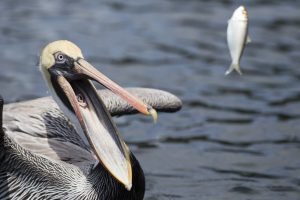Brown Pelicans hang out at piers and docks frequented by fishermen. They always look hungry and are very good at making eye contact to communicate their fishy request. Any angler can attest to having a Brown Pelican or other wild water bird beg for the contents of the bait bucket or carcass leftovers. But did you know that feeding pelicans bait and fish scraps can cause severe harm and injury?
Pelicans are unable to digest large fish bones, especially the exposed bones on fish filets. These bones can become lodged in and puncture the bird’s pouch, throat, and stomach, resulting in an internal infection and a miserable death.

Additionally, offering leftover bait teaches the birds to stop fishing and rely on humans as a food source. Pelicans can snag a baited hook, get entangled in the monofilament line, and birds can become sick by not getting the proper nutrients they need to survive.
Docks and piers will sometimes have carcass tubes at filet stations that deposit the fish scraps underwater and away from the begging water birds. Unfortunately, this presents water quality problems for areas that do not flush well and threaten manatees and sea turtles. Recent research has documented manatees, mainly vegetarians, consume the discarded fish carcasses near these tubes, leading to peritonitis in the manatees.
So, how can you help?
1. Refrain from feeding wild water birds, even if they are begging.
2. Stop casting if pelicans or other birds are chasing the baited hook and relocate to another fishing spot.
3. Choose to discard fish carcasses and bait in covered trashcans.
For directions if a pelican is hooked by mistake, visit: https://myfwc.com/unhook
 0
0
